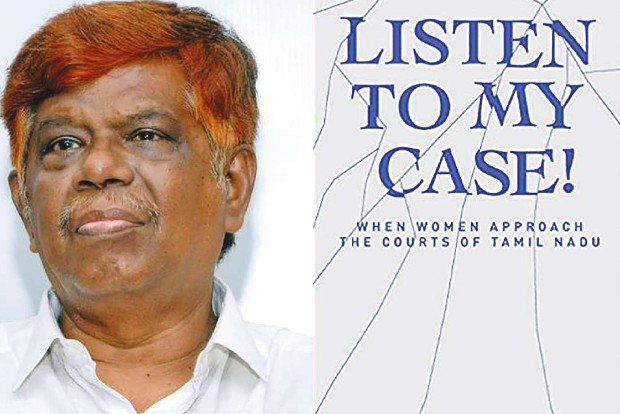Begin typing your search...
Case files from a compassionate judge
There are many books on bravery by women, but none quite like the collection of accounts of women who have fought for justice in the book Listen To My Case!. Former judge of the Madras High Court and noted columnist Justice K Chandru recounts the real life stories of what women face when they approach the courts.

Chennai
Title: Listen to My Case! When Women Approach the Courts of Tamil Nadu Author: Justice K. Chandru Publisher: Left Word Books Price: Rs 195
In a country that is known to have a long-drawn out and complicated legal system, it is truly eye-opening to get a first-hand account of the plight of these women who have fought for justice despite not having any understanding of law, financial backing and sometimes even the support of their family.
The book starts with an introduction by novelist Githa Hariharan who narrates her own legal encounter in the nineties which resulted in a landmark judgement, one that is considered a ‘milestone in the struggle for women’s rights’. What follows are 20 short accounts women who sought legal recourse for their grievances. And when you read each case, you are filled with empathy towards these women. Each episode speaks volumes about not just the women, but also the author, who clearly and effortlessly takes us through each case, the proceedings and his judgments.
Take the case of Asan Banu, a widow who was suspended from work after she approached the court against her employer Madurai Corporation. Asan was given a job on a compassionate ground after the sudden death of her husband, who was a ‘last grade servant’ with the Corporation. When the Corporation asked her to vacate the premises where she continued to live after her husband’s demise she approached the Madras High Court against eviction. Angered by this, the Corporation gave her a show cause notice asking her to explain why she approached the High Court without getting permission from the Commissioner. She once again went before the Madurai bench and complained about the second show cause notice. The court came down heavily upon the Corporation and their attempt to prevent a citizen’s right to move court to establish their legal rights. The court observed that people do not require anybody’s permission to move the court, and imposed a cost on the Corporation for harassing a junior employee from asserting her rights.
Another disturbing story is that of Tamilarasi, who was employed as an Anganwadi worker. She was removed on the specious ground that she was a schizophrenic and that too without any medical basis. The court persuaded her to go for examination by psychiatric experts at the Madurai government hospital and found nothing was wrong in her mental ability. For the first time the court observed that even a person who becomes mentally challenged while in service cannot be removed and pointed out the provisions of the Disability Act prohibiting such termination. The government officials were criticized for not being sensitive to such issues of mental illness and a cost was imposed on the District Collector for her illegal termination.
There are cases that we have seen in the papers and are familiar with, but may not have known the details. One such heartrending case is that of a young transgender Pandian who faced 2 unspeakable torture at the hands the police, which forced him to commit suicide. He set himself ablaze at the police station premises in 2006. His dying declaration helped convict the policemen responsible for his death. This case took a lot of involvement from the High Court which explored all aspects of the case before arriving at the judgement.
This book is an important read, particularly for law students, lawyers, journalists and those involved in social issues and women’s rights. The observations made by the court and the reference to the complete court order adds great value for those who want to read in more detail. But most of all, this book restores one’s faith in the judicial system. Justice Chandru is known and respected for his judgements, and his integrity and commitment shine through when one goes through each case. He has passed several landmark judgements during his tenure and some of the judgements featured here will go down in history. His characteristic ‘plain-speak’ style adds to the clarity of expression, something that often gets lost in ponderous legal jargon.
Punitha is the HoD for the Media Department at WCC, Chennai
Visit news.dtnext.in to explore our interactive epaper!
Download the DT Next app for more exciting features!
Click here for iOS
Click here for Android
Next Story



